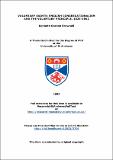Voluntary saints : English Congregationalism and the voluntary principle, 1825-1962
Abstract
This thesis is a study of the theory and practice of the voluntary principle in English Congregationalism between 1825 and 1862. The voluntary principle came to be seen in this period as of the essence of Congregationalism and its Congregationalist adherents sought to achieve its consistent practice in every aspect of denominational life.
Chapter 1 describes the breakdown of the old 'catholic' consensus in British
evangelicalism. By the mid-1820s the cooperation born of revival was being sorely tested on a number of fronts. Politics was certainly important, but there was also growing denominational self-interest. This was particularly the case in home and foreign missions and Congregationalists, perhaps the most 'catholic' of bodies, were under pressure from within and without to pursue a more partisan policy. Out of these practical concerns emerged, as chapter 2 points out, a more clearly articulated theory of voluntary churchmanship. Of course voluntarism had been a principle of Congregational Independency since the 17th century, but some adjustment was needed to the
new circumstances of the 19th century. Congregationalist and other dissenting apologists
honed and refined the principle and gave it a sharpness and comprehensiveness
it had never had before. Even such a 'catholic' nonconformist as John Angel James
saw the need to instruct his congregation in its Dissenting principles. He and many
others provided the theoretical basis for the practical exercise of the voluntary
principle.
With chapters 3 and 4 I turn to the internal consolidation of the Congregational community. The Congregational Union (chapter 3) provided an agency for denominational activity and a focal point for an otherwise highly decentralised community. In our period the union was only moderately successful in realizing its objectives, but it provided a forum for discussion even if it showed the limitations of Congregational voluntarism. By the late 1850s the union was seriously threatened by its too many commitments, local indifference and internal strife. Perhaps more successful was the
Dissenting and denominational press (chapter 4) in consolidating the community. Congregationalists were active in both the wider assenting press as well as their own denominational press.
The voluntary principle was seen to be of great importance in the areas of education and chapel building. It was in both these areas that Congregationalism was most seriously challenged by the Establishment and it was here that the voluntary principle was most evidently curtailed. The education battle (chapter 5) was a valiant one, but it was doomed from the start. The Congregationalist system simply could not sustain a viable alternative to the state-supported system. Chapel building (Chapter 6) was more successful, but its success was itself a recognition of the limited resources of the Congregational community and therefore of the voluntary principle.
Type
Thesis, PhD Doctor of Philosophy
Collections
Items in the St Andrews Research Repository are protected by copyright, with all rights reserved, unless otherwise indicated.

